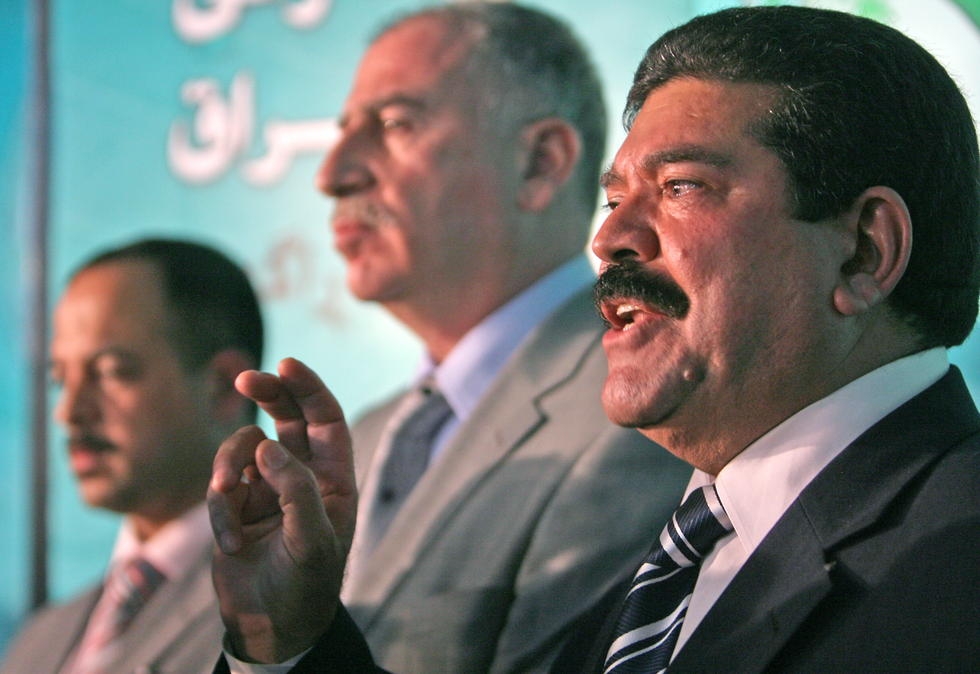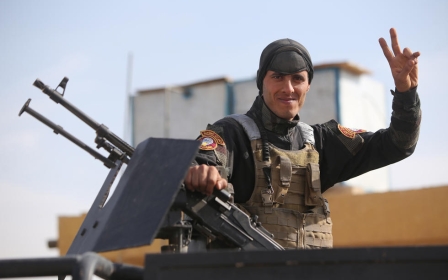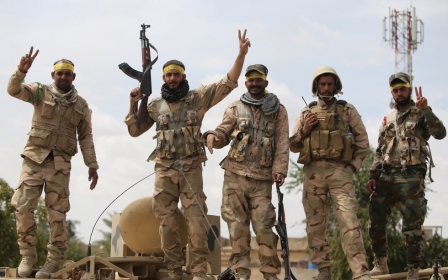The Iraqi Islamic Party: Failing the Sunnis

The saddest thing about Iraq’s current chaos is that it could have all been avoided. The American coalition would have still illegally invaded and unleashed all manner of horrors in 2003 but, more than 12 years later, things could have been well on their way to a resolution.
As someone who has had close contact with the Iraqi Islamic Party (IIP), I can confidently state that it was perhaps one of the singularly best-placed parties that could have made a significant difference in post-Saddam Iraq. Instead, I have spent years watching in dismay as the party has blundered from one disaster to another, failing its core Sunni constituents (especially Arabs, but also Kurds and Turkmens). Sadly, rather than being a part of the solution, they abandoned their principles and became a part of the problem.
The IIP was founded in 1960 upon an Islamic ideology not too dissimilar from that of the unjustly maligned Muslim Brotherhood in Egypt. From its earliest days, the party called for the establishment in Iraq of the Islamic principles of justice, unity and freedom from government oppression.
In those days, their ideology, which accepted the rights and equality of the different ethnic groups in Iraq, led to them being banned and persecuted by the secular Arab nationalist regime. This state of affairs continued once the Baathists took over fully in 1968, and the party was forced to operate underground or in exile until the ill-fated US-led invasion in 2003. During that time, particularly in the late 1990s, the IIP began to morph away from its Islamic roots and increasingly adopted unprincipled pragmatism due to their hatred of Saddam Hussein.
In December 2002, the IIP was one of the Iraqi opposition parties that answered the call of the United States and conspired with those whose agendas are pro-Iranian and pro-American. For instance, among those present were the Supreme Council for the Islamic Revolution in Iraq (SCIRI) and the Dawa Party, which has produced a series of disastrous and sectarian Iraqi prime ministers in the past decade.
As was well known to the IIP, these groups committed extremist acts in Iraq and other Arab countries during the 1980-1988 Iran-Iraq War in their attempts to help export the fundamentalist Shia Khomeini revolution to the Arab world. Iraqi Shias in their millions helped in the fight against Khomeini’s regime during the 1980s, and yet the leadership of a Sunni Islamic party in 2002 could not grasp the lack of patriotic credentials represented by Iranian proxies who were all brought together by America, the “Great Satan” enemy of Iran.
Following the invasion, the IIP under Mohsen Abdulhamid joined the Iraqi Governing Council (IGC) that functioned under the aegis of the Coalition Provisional Authority led by American administrator Paul Bremer. In an interview with Al Jazeera, Abdulhamid acknowledged that Iraq was under occupation, but also felt that the IGC had imposed Iraqi self-determination in its ability to rule independently. I never understood this, as I could not fathom how a government formed under occupation could have autonomy.
Later, Abdulhamid stated that the IIP had to deal with the inevitable fact that Iraq was under American occupation and, if they did not participate in the political process, the Sunni voice would lack representation. Whilst I continued to disagree, as I believe the Americans used the IIP to show Sunni support for the political process, I could understand the logic. The IIP was one of the few multi-ethnic parties (Abdulhamid himself is Kurdish) that had the potential to gain broad grassroots support.
Following Abdulhamid’s arrest at the hands of the US occupation for daring to boycott the elections to draft a new constitution that he saw as illegitimate and unfair, an internal shift within the IIP saw Tariq al-Hashimi become party leader.
Hashimi showed promise, and in the first general elections he and others in the Accord Front managed to become the third-largest bloc after gaining 15 percent of the total vote, giving Sunnis a credible platform from which to counter the spread of sectarian Iranian influence and the effects of the American invasion. Sadly, however, this did not last.
Rather than capitalising on these successes and building further grassroots support amongst Iraqis of all ethnicities and sects, Hashimi seemed content to use his newfound political capital to start building a personality cult. He visited Iraqi prisoners (mostly Sunni) in government jails and brought TV crews with him, promising them that he would do his best to secure their release. This he categorically failed to do, even though he could have at least threatened to delegitimise the government by ordering his bloc not to attend parliament.
These prisoners remained in Iraqi jails, and their executions took on a perverse kind of normality under the bloodthirsty and sectarian regime of then-prime minister Nouri al-Maliki.
Eyeing greater influence and power, and perhaps viewing the IIP as somewhat of a dead political weight (no thanks to his leadership), Hashimi resigned as party leader and joined Ayad Allawi’s secular Iraqiyyah List just prior to the 2010 election.
It did not work out well for him, because as soon as American forces withdrew from Iraq in 2011, Maliki chased Hashimi out of the country, and then had his politicised judiciary charge, convict and sentence him to death as a “terrorist”. Thus ended the political career of Hashimi, and the sinking ship of the IIP continued to sail on without him with a new leadership at the helm.
Rather than patching up the vessel to keep it afloat, the leadership (which in 2009 was comprised of Usama al-Tikriti and the present party leader Ayad al-Samarrai) continued to steer it towards the rocks.
Aside from not even bothering to release a timely statement condemning Iranian soldiers taking over an Iraqi oil field in 2009, I remember attending an IIP meeting in early 2013 in the UK and listening to the leadership talking about establishing an autonomous Sunni Arab federal region, the latest fad in Sunni politics. There was no discussion on the implications of this, considering that this federal region would be landlocked, and unlikely to get aid from bordering countries.
The Sunni Arab entity would have also been bordered by the Kurds, who would have deemed them a threat, and also it would have been reliant on funding from the central Baghdad government whom the IIP had already identified as being sectarian.
The IIP finally sank after failing to side effectively with the peaceful 2012-2013 protest movement that erupted after years of enduring Maliki’s sectarian abuses. The IIP stood by and watched as Iraqis took to the street and died in places like Hawija.
Using family connections, I personally wrote to the IIP, urging them to leave parliament and join the Iraqis they were supposed to be representing. Unsurprisingly, I did not receive a response, but Samarrai later appeared on Arab media and said that the Iraqi people had elected them to represent them in parliament, and there they should remain. Samarrai did not seem to consider the obvious fact that those who elected the IIP had lost so much faith in the political process that they were now literally risking life and limb to try to force positive change in a process that the IIP were a part of and failed to change.
By not withdrawing from parliament, the IIP thus forfeited any claims of being representative of the Sunnis, or indeed the Islamic cause implied in their name that advocates fearlessly championing the oppressed against the oppressor.
The IIP must share in the blame for the growth of extremists such as the Islamic State (IS) group, as well as state-sponsored Shia extremist groups. They abandoned principled and measured Islamic politics that appealed to a large segment of the Iraqi population in favour of immoral pragmatism, stood by a corrupt and violent regime, and failed to engage with their core constituents, the vast majority of whom have abandoned them, and the political process along with them.
By paying only token lip service to the ideals embodied by the likes of Sheikh Abdulkareem Zaydan, part of their classical leadership, the IIP removed any moderate alternative to resist the tyrannical Green Zone regime, and even managed to help in creating nostalgia for Baathist rule. Whilst not singularly the IIP’s fault, Sunnis are now worse off than ever before, and the rest of the Iraqi people along with them.
Through one way or another, the IIP cast off the mantle of unitary Iraqi Islamic politics, and it remains to be seen whether anyone else will fill the void.
- Tallha Abdulrazaq is a researcher at the University of Exeter's Strategy & Security Institute, and winner of the Al Jazeera Young Researcher Award. He blogs at thewarjournal.co.uk and tweets from @thewarjournal
The views expressed in this article belong to the author and do not necessarily reflect the editorial policy of Middle East Eye.
Photo: Iraqi Islamic party MP Omar Khalaf al-Juburi, speaks to the press following an Iraqi Parliament session in which a law to govern the country's general elections was agreed upon in Baghdad on 8 November 2009
New MEE newsletter: Jerusalem Dispatch
Sign up to get the latest insights and analysis on Israel-Palestine, alongside Turkey Unpacked and other MEE newsletters
Middle East Eye delivers independent and unrivalled coverage and analysis of the Middle East, North Africa and beyond. To learn more about republishing this content and the associated fees, please fill out this form. More about MEE can be found here.





